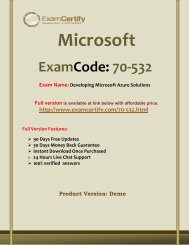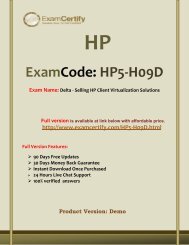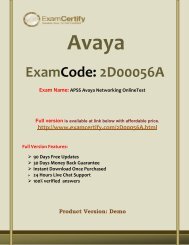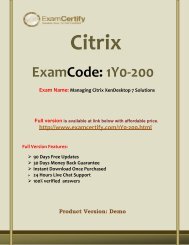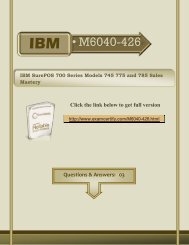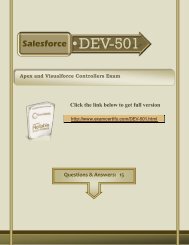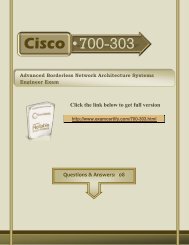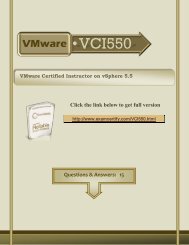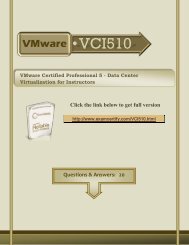•1Z0-418
You also want an ePaper? Increase the reach of your titles
YUMPU automatically turns print PDFs into web optimized ePapers that Google loves.
Oracle<br />
<strong>•1Z0</strong>-<strong>418</strong><br />
Oracle Fusion Global Human Resources 2014 Essentials<br />
Click the link below to get full version<br />
http://www.examcertify.com/1Z0-<strong>418</strong>.html<br />
Questions & Answers: 10
Question: 1<br />
What Oracle Fusion Middleware features maximize the security of Fusion Applications?<br />
A. Improved productivity, manageability, and responsibility<br />
B. Improved extensibility, responsibility, and functionality<br />
C. Improved productivity, adaptability, and manageability<br />
D. Improved sustainability, adaptability, and extensibility<br />
E. Improved adaptability, extensibility, and functionality<br />
Answer: B<br />
Explanation:<br />
Extensibility:<br />
Be able to customize and extend Oracle Fusion CRM applications. Responsibility through Roles.<br />
Functionality: Function security.<br />
Reference: Oracle Fusion Applications Security Guide<br />
Question: 2<br />
You want to display a new field of sensitive data to display salary information. Which security policy<br />
controls access to the field displayed by the component?<br />
A. Function Security Policy<br />
B. ADF Security expression language<br />
C. Data Security Polity<br />
D. Oracle Platform Security Policy<br />
Answer: C<br />
Explanation:<br />
Functions and data are inaccessible to users unless they are provisioned with the roles necessary to<br />
gain access. Function security provides users with access to pages in application users interfaces and<br />
actions that can be performed there. Data security allows users to see data in those pages. Some<br />
data is not secured, in which case access to a user interface page gives unrestricted access to the<br />
data that is accessible from that page.<br />
Reference: Oracle Fusion Applications Security Guide, Function and Data Security<br />
http://www.examcertify.com/1Z0-<strong>418</strong>.html Page 2
Question: 3<br />
Select the four products offered as part of the Oracle Fusion HCM product family under the business<br />
process category of Workforce Development.<br />
A. Profile Management<br />
B. Performance & Goal Management<br />
C. Time and Labor<br />
D. Talent Review<br />
E. Network at Work<br />
F. Learning Management<br />
Answer: A,B,D,F<br />
Explanation:<br />
Reference: Oracle Fusion Applications Workforce Deployment Implementation Guide<br />
Question: 4<br />
As a line manager you have 10 direct reports. You have certain work scheduled that needs to be<br />
completed in the coming week. You have identified three of your reports to complete the task and<br />
you would like to check for their availability in the coming week.<br />
Which report will give you a snapshot of their availability?<br />
A. My Organization<br />
B. Leave Availability<br />
C. Worker Availability<br />
D. Predicted Worker Performance and Attrition<br />
Answer: C<br />
Explanation:<br />
Worker Availability: How It Is Determined The availability of a worker during a selected time period is<br />
automatically determined using: Absence entries during that period The work schedule that the<br />
worker presently follows Calendar events<br />
Question: 5<br />
http://www.examcertify.com/1Z0-<strong>418</strong>.html Page 3
Identify the four business subprocess offered under the workforce Deployment category of the<br />
Oracle Fusion HCM family.<br />
A. Manage Absence<br />
B. Manage Global Workforce<br />
C. Manage Worker Performance<br />
D. Manage Social Networking<br />
E. Manage Workforce Profiles<br />
F. Manage Workforce Life Cycle<br />
Answer: A,D,E,F<br />
Explanation:<br />
A: The Manage Absences business process is performed by human resource (HR) specialists and<br />
employees, or their managers, to provide accurate records of absences for reporting and payroll<br />
calculations.<br />
D: You can create and join networks of people in your enterprise to collaborate, share knowledge,<br />
and achieve goals. Use the examples in this topic to understand how you can benefit from a social<br />
network.<br />
E: The Manage Workforce Records business process enables access to the worker directory and<br />
management of worker document records and checklists.<br />
F: The Manage Workforce Lifecycle business process covers all stages of a worker's association with<br />
the enterprise, from creation of the person record through termination of work relationships.<br />
Reference; Oracle Fusion Applications Workforce Deployment, Human Resources Guide<br />
Question: 6<br />
You are working on Implementing Fusion Human Capital Management. Some of the work structures<br />
and need to be configured manually. Enterprise, Business Units, Legal Entities, Reference Sets, and<br />
Legislative data Group will be part of this manual setup.<br />
Identify the correct sequence of steps to be followed for this setup.<br />
A. Create Enterprise > Define Business Units > Define Legal Entities > Define Reference Sets > Define<br />
Legislative Data Group.<br />
B. Create Enterprise > Define Legal Entities > Define Business Units > Define Reference Sets > Define<br />
Legislative Data Group.<br />
C. Create Enterprise > Define Business Units > Define Legislative Data Group > Define Legal Entities ><br />
Define reference Sets.<br />
D. Create Enterprise > Define Legal Entities > Define Reference Sets > Define Business Units > Define<br />
Legislative Data Group<br />
Answer: B<br />
http://www.examcertify.com/1Z0-<strong>418</strong>.html Page 4
Explanation:<br />
The following figure and chart describes the Business Process Model structures and activities.<br />
Reference:<br />
Oracle Fusion Applications Product Information Management Implementation Guide 11g, Enterprise<br />
Structures Business Process Model: Explained<br />
Question: 7<br />
Identify the two applicable model profiles for workforce structures.<br />
http://www.examcertify.com/1Z0-<strong>418</strong>.html Page 5
A. Jobs<br />
B. Individual worker<br />
C. Position<br />
D. Department<br />
E. Location<br />
F. Business unit<br />
Answer: A,C<br />
Explanation:<br />
Model profiles identify the competencies, qualifications, and experience required for a workforce<br />
structure, such as a job or position.<br />
Reference; Oracle Fusion Applications Workforce Development Guide 11g, Model Profiles: Explained<br />
Question: 8<br />
What are the three benefits of Oracle Fusion Applications using a Lightweight Directory Access<br />
Protocol (LDAP) system?<br />
A. enforces the principle of least privilege<br />
B. segregates duties to be more rigorously enforced<br />
C. allows principles of assured revocation to be more rigorously enforced<br />
D. extends the database concept of a grant to applications<br />
E. uniquely identifies a single person<br />
Answer: A,B,C<br />
Explanation:<br />
Oracle Fusion Applications applies the following standard security principles:<br />
* Least privilege (A) Oracle Fusion Applications roles carry only required privileges. Application roles<br />
define duties that entitle access to only the functions and data necessary for performing the defined<br />
tasks of that duty.<br />
* Segregation of duties (B) Oracle Fusion Applications checks duty roles for segregation of duties<br />
policy violations measured against content and the risks defined in the Oracle Application Access<br />
Controls Governor (AACG) and against content according to best available security guidelines. User<br />
and role provisioning respects the segregation of duties policies.<br />
* Containment and no write down<br />
* Transparency<br />
* Assured revocation (C) Revoking one security policy revokes all implementations of that policy<br />
across all tools in production.<br />
* Defense in depth<br />
E: The process Retrieve Latest LDAP Changes sends to Oracle Fusion HCM among other items:<br />
http://www.examcertify.com/1Z0-<strong>418</strong>.html Page 6
Reference: Oracle Fusion Applications Security Guide 11g<br />
Question: 9<br />
There are two distinct lists of grades that should be available in two separate business units of your<br />
organization. During testing, you notice that the lists of grades between the two business units are<br />
not per the requirement.<br />
Indicate what has gone wrong in the setup.<br />
A. The grade sets of the two business units have been interchanged<br />
B. The grade rate of the two business units have been interchanged.<br />
C. Incorrect grade ladder is attached to the two business units.<br />
D. All grades are available at enterprise level only.<br />
Answer: A<br />
Explanation:<br />
Grades and Sets<br />
Sets enable you to share grades that are common across business units in your enterprise. You can<br />
assign grades to either a specific set or to the common set to each grade. If you assign the grade to<br />
the common set, then the grade is available for use in all business units.<br />
Note:<br />
* grade rate Used to define pay values for grades in a legislative data group.<br />
Reference: Oracle Fusion Applications Compensation Management Implementation Guide, Define<br />
Workforce Structures: Define Grades<br />
Question: 10<br />
Your company wants to track the previous employment information for workers, including employer<br />
name, dates of employment, and job description. What should you do?<br />
A. Create a new content type and content item.<br />
B. Use seeded content type and new content item.<br />
C. Create a new content type but seeded content item.<br />
D. Create free-form content type and new content item.<br />
E. Create free form content type without content item.<br />
Explanation:<br />
Answer: E<br />
http://www.examcertify.com/1Z0-<strong>418</strong>.html Page 7
Free-form content types enable you to capture information in a profile that you do not need to store<br />
in the content library. For example, you can set up a free-form content type to store information<br />
about the previous employment information for your workers.<br />
A free-form content type contains only a code, name, and a description, and does not have any<br />
properties defined for it until you add it to a profile type. Free-form content types do not include any<br />
content items.<br />
Reference: Fusion Applications Help, Define Workforce Profiles FAQs<br />
http://www.examcertify.com/1Z0-<strong>418</strong>.html Page 8
Oracle<br />
<strong>•1Z0</strong>-<strong>418</strong><br />
Oracle Fusion Global Human Resources 2014 Essentials<br />
Click the link below to get full version<br />
http://www.examcertify.com/1Z0-<strong>418</strong>.html<br />
Latest tests<br />
70-331 70-332<br />
LOT-951 70-321<br />
HP2-T25<br />
HP2-T26<br />
70-341 70-342<br />
70-411 70-410<br />
70-336 PEGACLSA_62V2<br />
70-337 C_TADM51702<br />
HP0-J54 00M-662<br />
70-689 000-N37<br />
70-480 HP0-J59<br />
http://www.examcertify.com/1Z0-<strong>418</strong>.html Page 9



